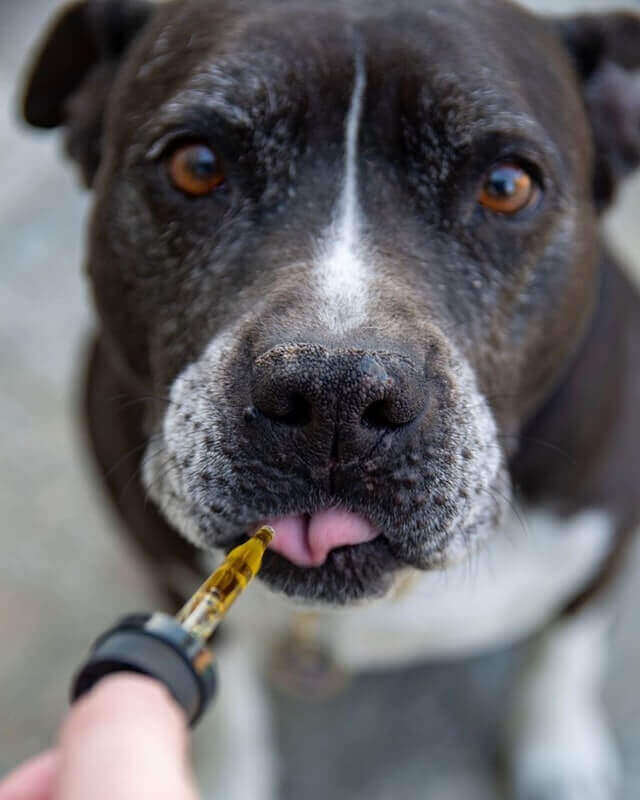
Cannabidiol (CBD) is just one of the various compounds found in the cannabis plant. Science has recently begun to study many of its potential health benefits. You’ve probably heard about it lately. Perhaps friends or family have told you how it’s helped them cope with mental or physical ailments. Or maybe you use it yourself and have experienced its benefits first-hand.
But did you know that your dog or cat can use it too? That’s right, just like humans, your canine or feline friends can also safely benefit from the use of CBD. That’s because they too have an endocannabinoid system. This system is what CBD stimulates in order to regulate the body and bring it back to homeostasis.
Dog and cat owners have found that CBD can help their pets cope with a variety of ailments. CBD can be used to comfort those dealing with issues such as pain, anxiety, depression, cancer, seizures, neurological and digestive disorders. CBD can also help with behavior problems as well. If your pet is irritable, withdrawn, shows signs of trauma or doesn’t get along with other animals, CBD may be able to help. CBD can also help by healing wounds, increasing appetite and easing end-of-life difficulties.
How CBD works
CBD acts on the endocannabinoid system. We actually produce natural endocannabinoids which are used to regulate our bodies and maintain homeostasis. The stability of all our body’s internal systems is called homeostasis. If you have an injury or illness, your body’s systems will be out of sync. In an attempt to regain homeostasis your body will produce natural cannabinoids that help your system regain normal function.
Sometimes the body needs a boost or just doesn’t produce enough of a certain chemical. This is when supplementation is needed. Just like thyroid, diabetes, or anti-depressant medicines CBD can help supplement an underperforming system. Except unlike most of those medicines, CBD is completely natural.
CBD can also help stimulate the endocannabinoid system to produce more receptors. This helps natural cannabinoids work better. The two types of receptors CBD acts on are CB1 and CB2. CB1 receptors are found in the central nervous system while CB2 receptors are found in immune cells and the peripheral nervous system.
The endocannabinoid system controls inflammatory and immune responses. Excess inflammation can cause a host of problems such as rheumatoid arthritis and cancer. Overactive or underactive immune responses can cause allergies, cancer and auto-immune diseases.
Safety
CBD is a non-psychoactive compound–meaning it doesn’t produce a high–found in the cannabis plant. Both marijuana and hemp are classified as cannabis, but their chemical constitution varies greatly. Hemp is high in CBD and very low in THC. Marijuana is the reverse. THC is the chemical that gets you high. Since CBD is extracted from the hemp plant it is not going to get your pets stoned.
A 2017 report by the World Health Organization found that CBD is safe and well tolerated by animals. CBD doesn’t usually interact with other medications or have side effects. However, it’s always a good idea to check and see if there are any contraindications between CBD and your pet’s medicine.
Keep in mind that until recently the cannabis plant was illegal in all states. Only recently in 2018 did the hemp plant become federally legal which eased and dropped some restrictions. While CBD is currently legal in all 50 states, it is still illegal for a vet to recommend it. Even if they think CBD will help your animal, they can’t suggest it. But we imagine these laws will change soon.
Navigating CBD Products
CBD comes in many different types and forms. Navigating and understanding them all can be a bit confusing. First let’s look at the different types of CBD available.
Full-spectrum CBD extracts all the chemicals from the hemp plant. These include CBD, other cannabinoids, terpenes and sometimes a tiny bit of THC. By law it has to be less than 0.3%. This is usually the most potent way to take CBD because all the compounds enhance each other and create something called the entourage effect. Basically, science found these chemicals work better together than alone. However, pets may be sensitive to the THC and have a bad reaction. Also, the flavor can be kind of grassy and turn off pets.
Broad-spectrum CBD has all the compounds besides THC. This is the best choice for dogs and cats because they get all the beneficial compounds minus the THC. So, they’ll still get the entourage effect and all the positive benefits without the risk that THC can pose. This has a less grassy, more mild flavor. Check out our tincture here.
CBD Isolate is pure CBD and nothing else. CBD isolate has no flavor possibly making it easier to slip into a picky animal’s diet. However, CBD isolate doesn’t produce the desired and powerful entourage effect. It lacks the other compounds naturally found in the plant making it less effective than the full & broad spectrum.
In addition to the various forms of CBD there are many products offering different routes of administration. CBD oil can be dropped into your pet’s food, mouth, or treats. You can also rub it on high-absorption areas such as the ears.
There may be some trial and error needed to determine which kind works best for your pet.
Dose
Dosages will vary by animal and situation. Again, some amount of trial and error may be needed.
The general recommendations for dosages are 1 to 5 milligrams for every 10 pounds. Meaning, if you have a 50-pound dog the dosage would be 5 to 25 milligrams. The first time it’s best to start on the lower side and see how your animal reacts. The lower doses usually won’t have much of an impact, but sometimes they can be just enough. If you notice a change with the lower dose, you may not need to go higher. Still, you might want to try the middle range next time to see if further benefits can be gained. Most animals respond best to the middle range. If you don’t notice anything within an hour, you can dose your pet again. Make sure to keep track of how much you give them each time and not exceed the highest recommended dose.
Make sure to always read the label of your CBD product because the potency between products can vary greatly. Also keep in mind that sometimes it’s hard to visibly gauge how your animal is feeling. They might be feeling better but you just can’t tell. If your animal becomes overly lethargic or sleepy you are probably giving them too much.
If your animal has an acute anxiety or pain problem, you can dose them every 8 hours. Otherwise, once or twice a day is usually sufficient.
Thoughts and Conclusions
For many, our animals are family members. We want to provide them with the best life possible. It’s heart wrenching when they are in pain or sick and of course we want to do anything you can to help them. One of our customers told us about how when their cat got sick it was hard to concentrate on anything else because they just wanted her to get better. Their cat was already taking prescription meds, but it didn’t seem to be enough. So, they tried CBD and it ended up making all the difference. Their cat became active and affectionate again. They believe the combination of prescription medicine and CBD is what finally helped her.
CBD is a great enhancement to any health regimen and can work in tandem with other prescription medications to give your pet exactly what they need.

